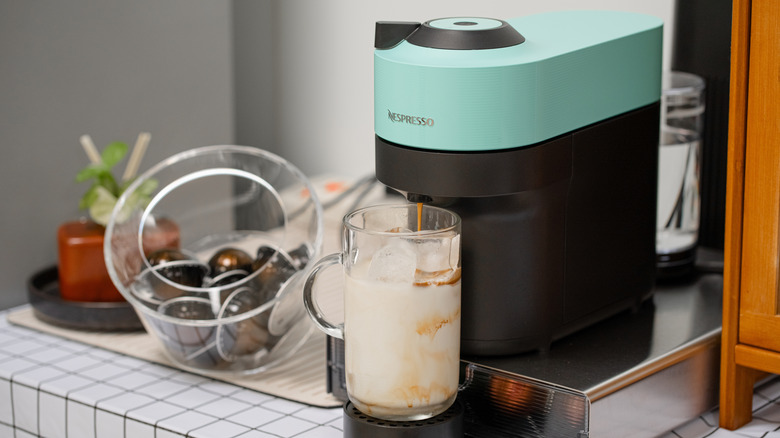What Not To Use When Descaling Your Nespresso Machine
We may receive a commission on purchases made from links.
Nespresso's machines aren't on the cheap side of things, so once you buy one, you want it to last a long time. While the quality of the machine itself certainly plays a role in determining its lifespan, so does your maintenance as the owner. Unfortunately, coffee makers aren't the "set it and forget it" type of gadgets — they require periodical cleaning, which includes descaling. The importance of descaling your Nespresso machine to remove mineral buildup cannot be understated, as it ensures the proper functioning of your coffee maker and the best tasting cup (the biggest motivator, to be honest). When descaling, stay away from any solution that's not specifically made for Nespresso's coffee machines — including vinegar.
Although there are many vinegar hacks for a cleaner kitchen, maintaining your Nespresso isn't one of them. The same goes for lemon or any other acidic cleaner you might have in your kitchen cupboard. The problem with using these types of acids for descaling is two-fold: First, they are not strong enough to descale the coffee machine in a short amount of time, so you'd have to let them sit for a while. This leads to the second problem: As they sit, they can harm the machine's rubber seals and other sensitive parts, ultimately shortening its lifespan — the exact opposite of what you're trying to achieve with descaling. Another problem, particularly with vinegar, is that it can leave behind an acidic taste and smell, which will come through in your future brews.
Nespresso's Descaling Kit — what it is and how to use it
Instead of reaching for a homemade cleaner or anything containing lemon juice or vinegar, Nespresso advocates for using its Descaling Solution, which is compatible with every Nespresso machine and designed to work with the special descaling mode on the machines. Some kits even come with a QR code on the package that you can scan for instructions. This descaling solution will clean the machine much quicker than vinegar but won't harm it or leave behind a strong odor — though Nespresso does recommend running a taste test brew after descaling, just to be safe.
The kit contains lactic acid, a powerful descaler and disinfectant commonly used in cleaning products. It can be very irritating to the skin, so wear gloves when handling it and wash your hands afterward. The descaling process is not complicated, but it can be a bit time-consuming because it requires you to run multiple cycles to completely flush out the solution. Thankfully, you only have to do it once a year, maybe twice if you're using your machine a lot or live in an area with hard water. Many Nespresso machines have a light signal that flashes when it's time to descale, but you should also pay attention to odd-tasting coffee, slower pours, or strange noises, as those are all signs of limescale buildup.

